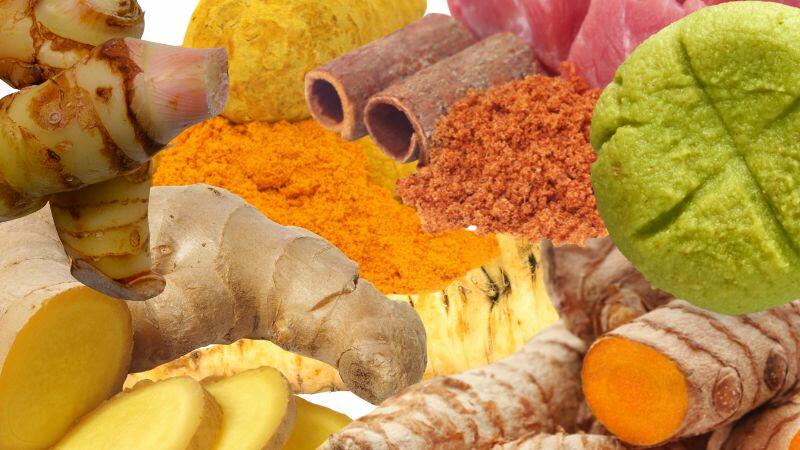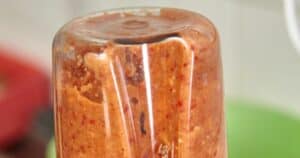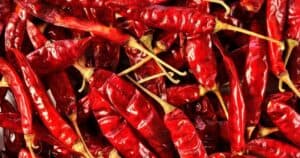If you like a bit of heat in your cuisine, you probably eat a lot of peppers or spices made from peppers, such as paprika. However, peppers aren’t the only spicy things in the food world that you can enjoy! If you’re looking to
Here are 7 spicy things that aren’t peppers that you should try:
- Turmeric
- Horseradish
- Ginger
- Galangal Root
- Wasabi Root
- Homemade Curry Powder
- Chaat Masala
Let’s take a closer look at each of these foods and spices to discover what makes them great options for spicy food enthusiasts.
1. Turmeric
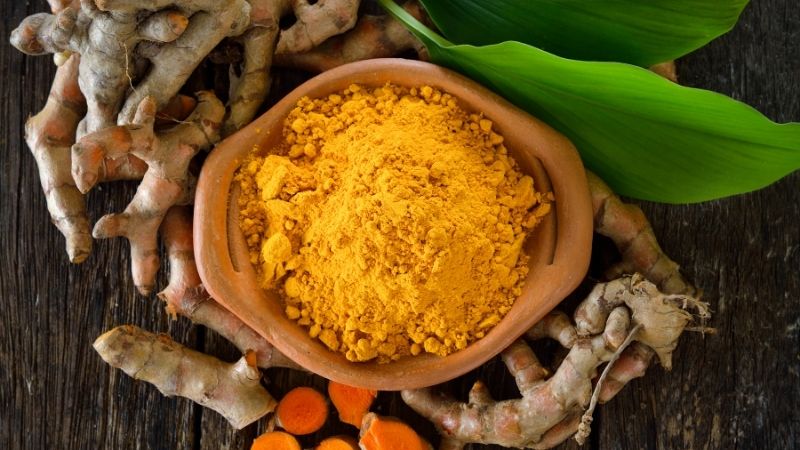
Turmeric is a rhizome, a fleshy underground stem native to Southeast Asia and India. Other examples of rhizomes include ginger and bamboo. Turmeric has an earthy and bitter flavor with a little
Turmeric doesn’t just add a bit of
Curcumin is naturally anti-inflammatory, which helps prevent heart disease, cancer, and Alzheimer’s disease. The
Here are some ideas for what you can make using turmeric:
- Vegetable pilaf
- Turmeric-fried rice
- Singapore noodles
- Turmeric latte
- Curry
2. Horseradish
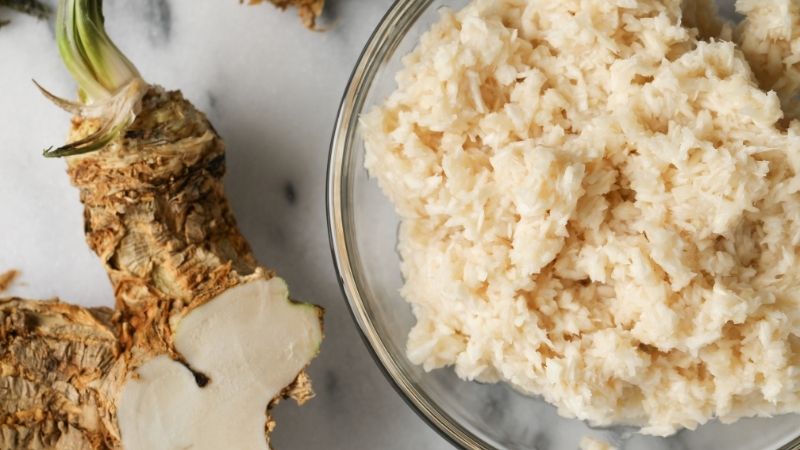
Horseradish is a white root vegetable that is in the mustard family. It contains isothiocyanate, which is the compound that makes horseradish taste hot and brings tears to the eyes, so adding some horseradish to a recipe will make it spicier and give it a distinct taste.
You can use the root fresh, dried, or powdered, and you can find it in all of its forms at most supermarkets. My favorite horseradish sauce is Beaver Deli Horseradish Sauce, which is available on Amazon. This sauce uses 100% freshly grated horseradish roots, and it adds a mild heat to recipes. I also like that it comes in a squeezable bottle, so it’s easy to put on a sandwich or salad without making a mess.
You can also buy fresh horseradish roots. When looking at the roots, you should choose one that is firm and has no green spots, which is a sign of mold. The roots also shouldn’t look too dry.
Here are some things you can make using horseradish:
- Bloody Mary
- Horseradish mayonnaise
- Horseradish pesto
- Bacon horseradish spread
- Honey-horseradish vinaigrette
3. Ginger
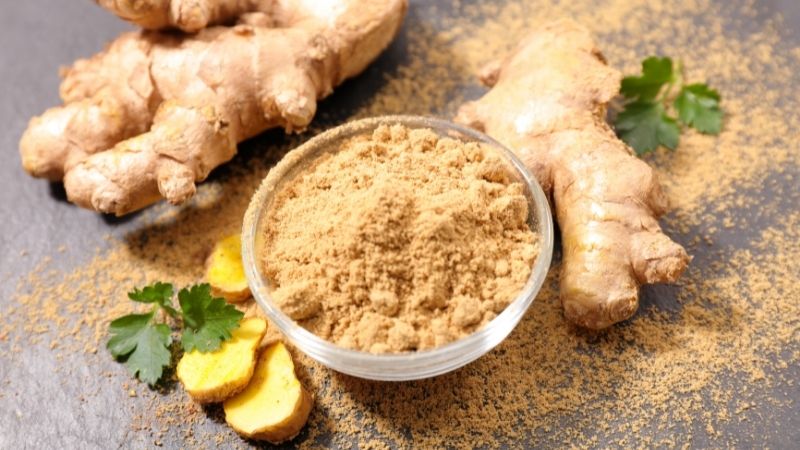
Ginger is a root that comes from the Zingiber officinale plant in Southeast Asia and is used in cooking and medicine. If you want more intense
Ginger contains many health benefits. Here are just a few:
- It reduces gas.
- By increasing movement through the digestive tract, it prevents constipation.
- It relieves nausea.
- If you’re pregnant, it can alleviate morning sickness.
- It protects the respiratory system.
- It reduces inflammation.
You can enjoy the taste and health benefits of ginger by using the fresh root in the following ways:
- Carrot ginger soup
- Ginger dijon dressing or sesame ginger dressing
- Ginger tea
- Ginger lime hummus
- Curried butternut squash soup
4. Galangal Root
Usually found in Southern Asia, galangal root is a
Like its cousin ginger, galangal root is associated with many health benefits:
- It’s rich in antioxidants.
- Galangin (a compound in galangal root) kills cancer cells.
- It boosts sperm count in men, aiding fertility.
- It fights inflammation.
- It boosts hyaluronic acid production, which helps the skin.
Here’s what you can make with this root:
- Thai peanut dipping sauce
- Malaysian pork satay
- Tom yum soup
- Curry paste
5. Wasabi Root
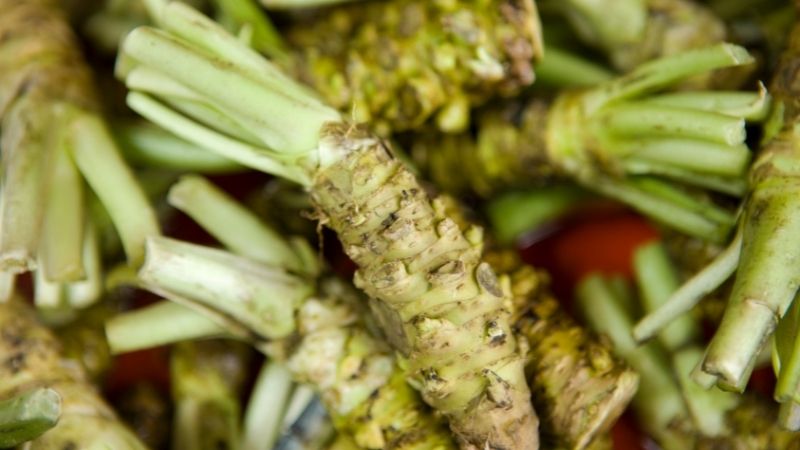
Wasabi root is made from the underground stem of a wasabi plant with a clean spicy flavor thanks to the allyl isothiocyanate. Most wasabi that you can buy in the store is imitation wasabi because real wasabi is quite expensive. Luckily, it will still provide the
My favorite wasabi is this Wasabi-O Paste, available on Amazon. I like it because it’s made with real, freshly grated wasabi instead of imitation horseradish. I also like that this paste comes in a tube, making it easy to squeeze out.
Wasabi is most often served with sushi, but you can also use it in other ways. Here are some ideas:
- Japanese ceviche
- Wasabi-seared tuna
- Wasabi tartar sauce
- Wasabi and cucumber ice cream
6. Homemade Curry Powder
Most curry powders you can buy at the store contain pepper, but you can easily DIY your own without pepper if you prefer by adding a variety of spices into a jar and mixing them together. Here are the spices you’ll need:
- Coriander
- Cumin
- Turmeric
- Ginger
- Dry mustard
- Cinnamon
- Cardamom
The combination of these spices creates a unique, spicy flavor that you can use in many different ways, including:
- Fried rice
- Curries
- Thai coconut chicken soup
- Curried eggs
- Chutney
7. Chaat Masala
Chaat masala is a tangy and spicy Indian
- Cumin seeds
- Coriander seeds
- Fennel seeds
- Mango powder
- Black salt powder
- Ground ginger
- Ajwain seeds
- Dried mint
- Asafetida powder
If you don’t want to make your own, I recommend buying this Rani Chaat Masala, which is available on Amazon.com. I like this mix because it’s made with no MSG and preservatives and is non-GMO, vegan, and gluten-free.
You can use chaat masala in the following ways:
- Sprinkled over any salad
- Tandoori chicken tikka
- Samosa chaat
- Chaat masala potatoes
Sources

